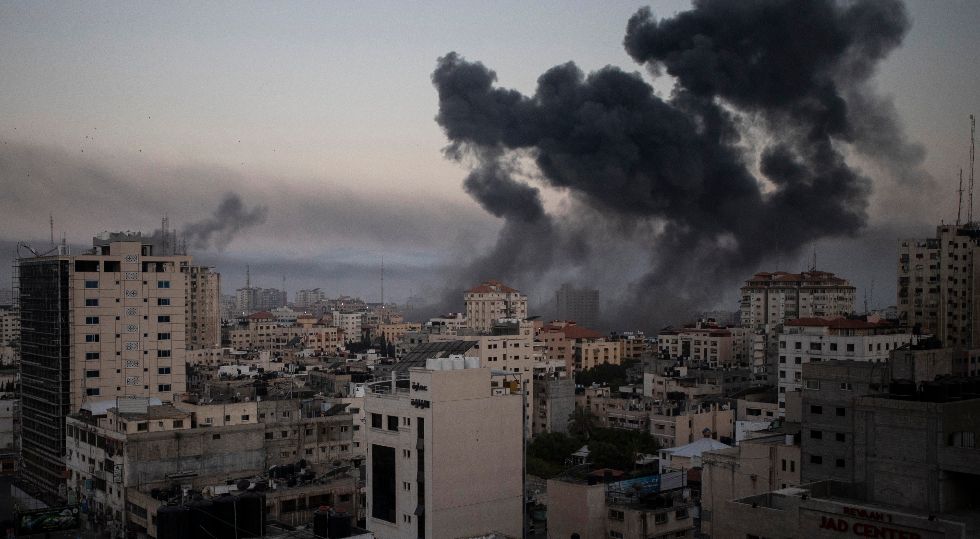As bloodshed in the Gaza Strip continues, the international community is watching the conflict with embarrassment, unable to enforce a ceasefire in yet another of the foretold Palestinian-Israeli crises.
Typical are the cases of the United States, which strives not to offend Israel, but also of a divided Europe with competing regional actors.
Joe Biden: caution
The US president, who has avoided including the Middle East dossier in his priorities, following the moves of Donald Trump’s predecessor in favor of Israel, is, against his will, at the forefront of crisis management.
His Western partners and the left wing of the Democratic Party are urging him to intervene by putting pressure on Israel, a traditional US ally, to de-escalate the crisis and then seek a political solution.
What is happening shows that the idea that some people had ignored the Middle East conflict lest it disappear on its own, leaving time to do its job, was a pure fantasy, commented French Foreign Minister Jean-Yves Le Drian.
Joe Biden yesterday called for “de-escalation to a ceasefire.” “But the traditional US stance is not to put pressure on Israel,” said Pascal Boniface, director of the Institut de Relations internationales et stratégiques (Iris) in Paris.
The Biden government, like its predecessors, prefers to favor bilateral diplomatic channels to the detriment of the UN, which has so far blocked any initiative to end hostilities, a European diplomatic source said.
After all, “at the moment, he realizes that there will be no political benefits from greater involvement in the search for a political solution,” as the prospects are slim, says Lucy Kurtzer-Ellenbogen of the Washington Institute of Peace.
What Israel and the US want to ensure is that Hamas will not emerge victorious from a truce, according to Ghaith al-Omari of the Washington Institute. The main goal is to radically limit its military capabilities.
The weakness of the Europeans
The European Union, Israel’s first economic partner and a key supporter of Palestine’s development, theoretically has pressure levers. But it remains divided (Hungary refused to sign a joint statement calling for a ceasefire) and has no voice on the issue.
“Divisions between the Member States have increased under the influence of the Trump administration, which has pushed the issue to the extreme,” said Pierre Vimont, a French diplomat and Carnegie Europe expert.
“Member States are too divided to use the pressure levers at their disposal,” he said, referring to a “complete lack of initiative.”
The European Union also refuses to put pressure on Israel by threatening to challenge its association agreement, while maintaining no contact with Hamas, which it considers a terrorist organization.
France, a permanent member of the UN Security Council, is counting on European support to step up pressure on the United States at the United Nations. But a French draft resolution calling for a cessation of hostilities and access to humanitarian services in Gaza runs counter to the US veto.
French President Emmanuel Macron also supports the mediation effort of Egypt, a historic interlocutor between Israel and Hamas.
Egypt
lags behind Qatar and Turkey, which are increasing their influence over Hamas, according to Haisam Hassanein of the Washington Institute. “Its role is suddenly limited to the search for a ceasefire when the escalation of the war is at its peak. “But the Israelis insist on keeping her in the game.”
For Pascal Boniface, Egypt can “accompany a compromise, dress up the outcome of a negotiation” between two warring parties that are not officially talking directly.
Qatar, which maintains “discreet relations” with Israel, can also serve as a mediator between the two wars.
Iran and Turkey Defenders of the Palestinian Cause
President Tayyip Erdogan is again emerging as a defender of the Palestinian cause against silent Arab countries, many of which have just normalized relations with Israel, such as Morocco, the United Arab Emirates and the United Arab Emirates. Bahrain.
Iran, which’s allegedly providing funding and weapons to Hamas and Islamic Jihad, is “benefiting from a conflict that did not explode,” according to the US-based Soufan Center.
Thus, Tehran appears as a defender of the Palestinian cause and through it the Sunni, and not only the Shiite, Islam. “This strengthens the (Iranian) strategy of exerting influence in the region, against the United States, Saudi Arabia and other adversaries,” according to the Soufan Center.
Russia and China in the background
Russia, which has good relations with both Israeli Prime Minister Benjamin Netanyahu and the Palestinian leadership, is calling for an urgent convening of the Middle East Quartet (Russia, US, UN, EU).
China has criticized the US stance in the Security Council after trying to pass a draft resolution calling for a ceasefire.



